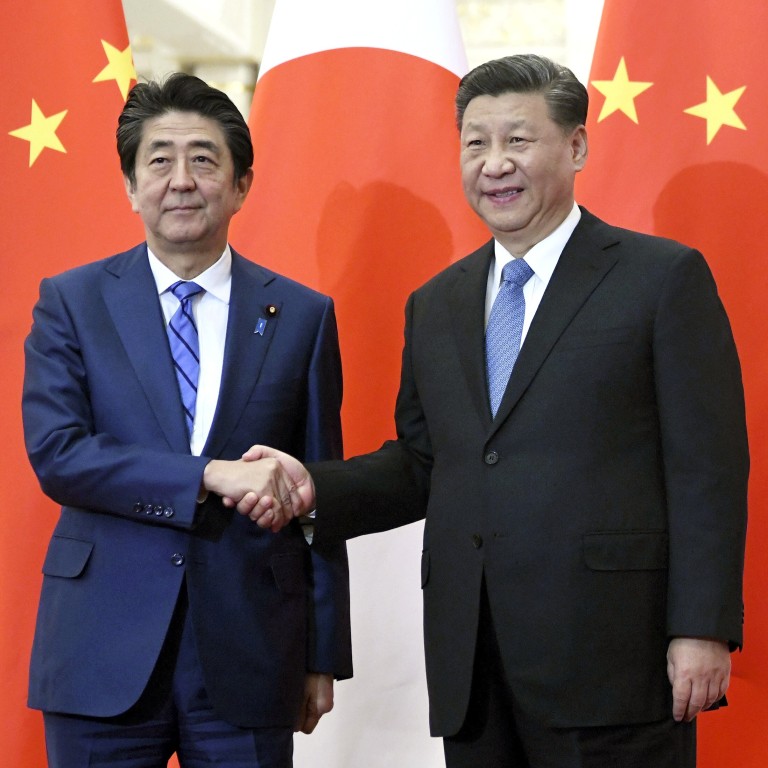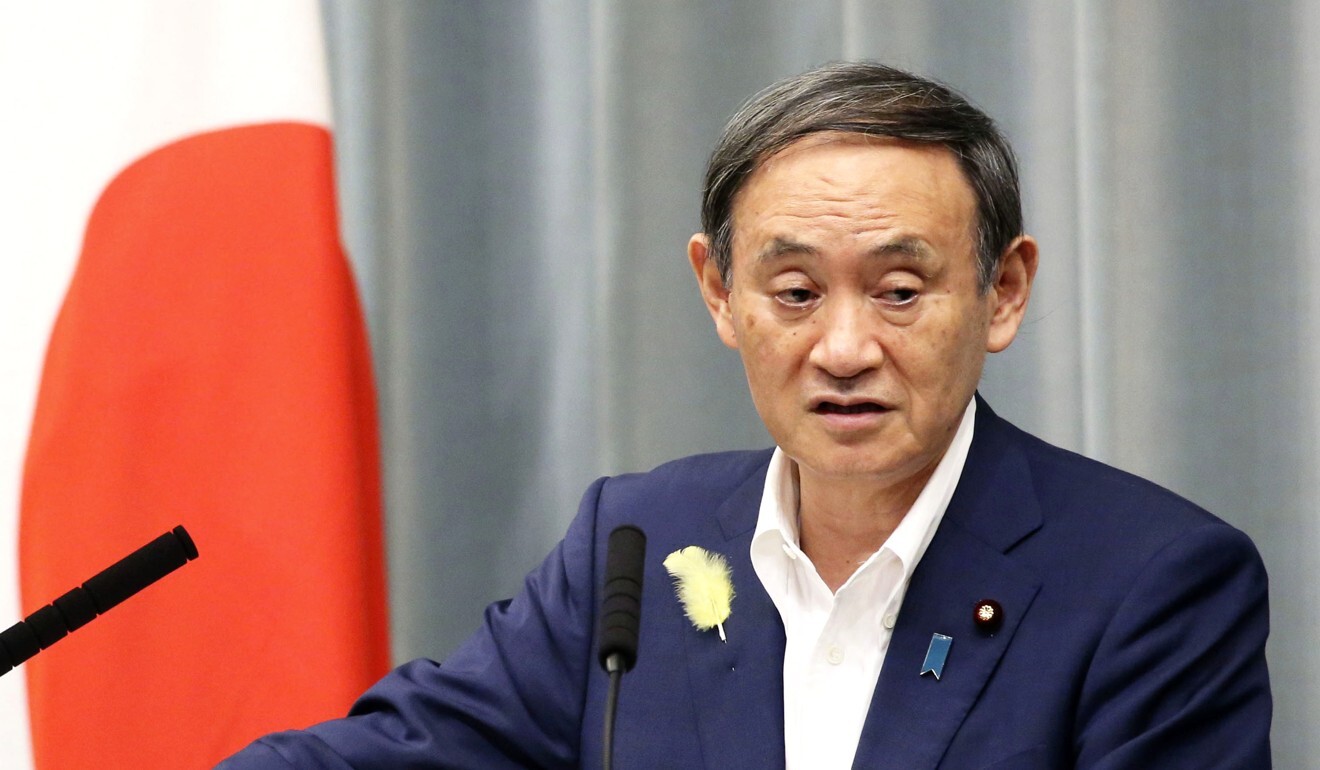
Hong Kong national security law and Covid-19 strain China-Japan ties
- Tokyo was due to host the Chinese president in April but his trip was postponed because of coronavirus
- Differences over Hong Kong’s national security law and other issues mean it may not be rescheduled
It was their fourth meeting since Abe’s official visit to the Chinese capital in October 2018 when Xi said the two countries should “promote the continuous development of bilateral relations along the correct track in the spirit of ‘turning competition into coordination’”, as reported at the time by state news agency Xinhua.
National security law: for Japanese, a chance to ‘poke red China’?
At that time, the two sides were working closely towards Xi’s planned state visit to Japan in April. It would have been the first such visit by a Chinese president since 2008, and was widely expected to include a major political document – the fifth between the two neighbours – that would lay the foundation for future relations.
On Friday, lawmakers from Japan’s ruling Liberal Democratic Party urged Tokyo to cancel Xi’s state visit, citing the situation in Hong Kong as the reason. Chinese Foreign Ministry spokesman Zhao Lijian gave a tough response, saying China had protested to Tokyo.
“Regarding Japan’s negative remarks concerning Hong Kong, China has made solemn representations to Japan. For some time China has not discussed the major bilateral agenda with Japan,” Zhao said.
“Some people in Japan have long been accustomed to making irresponsible remarks about the internal affairs of other countries and engaging in political hype. What I want to say is that their anti-Chinese dramas have no meaning to China, and we have no time and no interest in entertaining them”.
Japan has taken an unusually tough stance on Beijing’s tightening grip on Hong Kong. When asked about it at a regular press conference on Tuesday, Chief Cabinet Secretary Yoshihide Suga called the passage of the law “regrettable” – the second-strongest term in Tokyo’s diplomatic vocabulary after “condemned”, that was used to criticise North Korean missile launches.
Observers said the recent remarks by Japanese officials highlighted the continuing deep distrust between the two regional superpowers. “While hopes were growing that anti-pandemic cooperation would lead to further improvement in bilateral relations, there have been strong, dark currents flowing below,” said Liu Jiangyong, an international relations expert with Beijing’s Tsinghua University.
“There has been a comprehensive slide [in relations] which has come to a dangerous moment,” he added.

Some conservative lawmakers in Abe’s ruling Liberal Democratic Party have pushed for Xi’s trip to be cancelled, citing outstanding issues such as human rights in Hong Kong and China’s far-western Xinjiang region. Public sentiment against China has also become increasingly negative over the past few months.
The postponement of the 2020 Tokyo Olympics because of the coronavirus – after seven years of preparation and tens of billions of dollars in investment – was a heavy blow to the struggling Japanese economy, as well as to Abe’s government which has suffered its lowest approval rating in two years.
Critics in Japan have blamed the delay to the Games on Abe for failing to ban Chinese tourists in late January when the new coronavirus outbreak was in its early stages.
And, in a sign of the tense relations, Xi and Abe have not spoken since the disease outbreak, even as reports of generous help from Japan – in the shape of masks and emergency supplies – prompted praise from the Chinese public.
China and US clash derails ‘new era’ for Beijing-Tokyo ties
In sharp contrast, Xi has had three phone conversations with South Korean President Moon Jae-in and two calls with United States President Donald Trump, despite their bitter trade war.
In a move that could further infuriate the Chinese leadership, Japan was among the Group of Seven nations that signed a joint statement on June 17 expressing “grave concern” over the new law in Hong Kong.
Benoit Hardy-Chartrand, an international affairs expert at Temple University in Tokyo, said Japan was now under contradictory pressures from its long-term allies the US and China, its largest trading partner.
“On the one hand, [Japan] cannot afford to discount its important ties with China, which had been trending upwards since 2018, while on the other hand, it faces pressure from the US and its Western partners to show solidarity and present a united front in their opposition to the new security law,” he said.
Hong Kong national security law official English version:
While Tokyo had earlier expressed its concerns over protests in Hong Kong, there have been criticisms that Abe was not strong enough because of his planned summit with Xi.
“Now that the summit is off the table for the time being, and with the recent flare-ups in the East China Sea, Tokyo likely feels it has a freer hand in joining the chorus of disapproval,” Hardy-Chartrand.
But some experts said that while the use of “regrettable” to describe its reaction to the Hong Kong law may indicate a firmness of purpose from the Japanese government, Tokyo was still pulling its punches.
“This may be the second-strongest term that Japan can use, but there are far bigger considerations here,” Yakov Zinberg, a professor of East Asian studies at Tokyo’s Kokushikan University, said. “Japan has, in recent years, not been as active in criticising China and that remains the situation because of economic concerns in Tokyo and the desire for more trade.
“There are bigger issues at stake and Tokyo will not go any further than this because trade and their broader contacts with Beijing are so important,” he said.
India-Japan naval exercises: a message for China?
Hardy-Chartrand said tensions between Japan and China may continue for the next few months, “at the very least”, pointing out that “the recent Sino-Japanese rapprochement was founded on pragmatic considerations rather than a real convergence of views, as their territorial dispute in the East China Sea continued unabated, away from the public eye”.
Additional reporting by Julian Ryall

